Destination Management Strategy: A Reflective Analysis Essay
VerifiedAdded on 2023/06/11
|7
|1693
|106
Essay
AI Summary
This essay presents a reflective analysis of destination management strategies, focusing on personal development and key learnings. Part A discusses the author's experience with the Competing Values Framework (CVF), highlighting improvements in communication and creativity skills, particularly in the roles of innovator, broker, and facilitator. It emphasizes the impact of learning programs and personal experiences on enhancing management competencies. Part B delves into lessons learned from a blog, underscoring the significance of customer needs, communication, innovation, and environmental awareness in the hospitality industry. The reflection emphasizes the importance of considering all stakeholders, including employees and the local community, to ensure a positive brand image and customer satisfaction. The essay concludes by advocating for continuous improvement in creativity and communication skills to become a well-rounded manager.
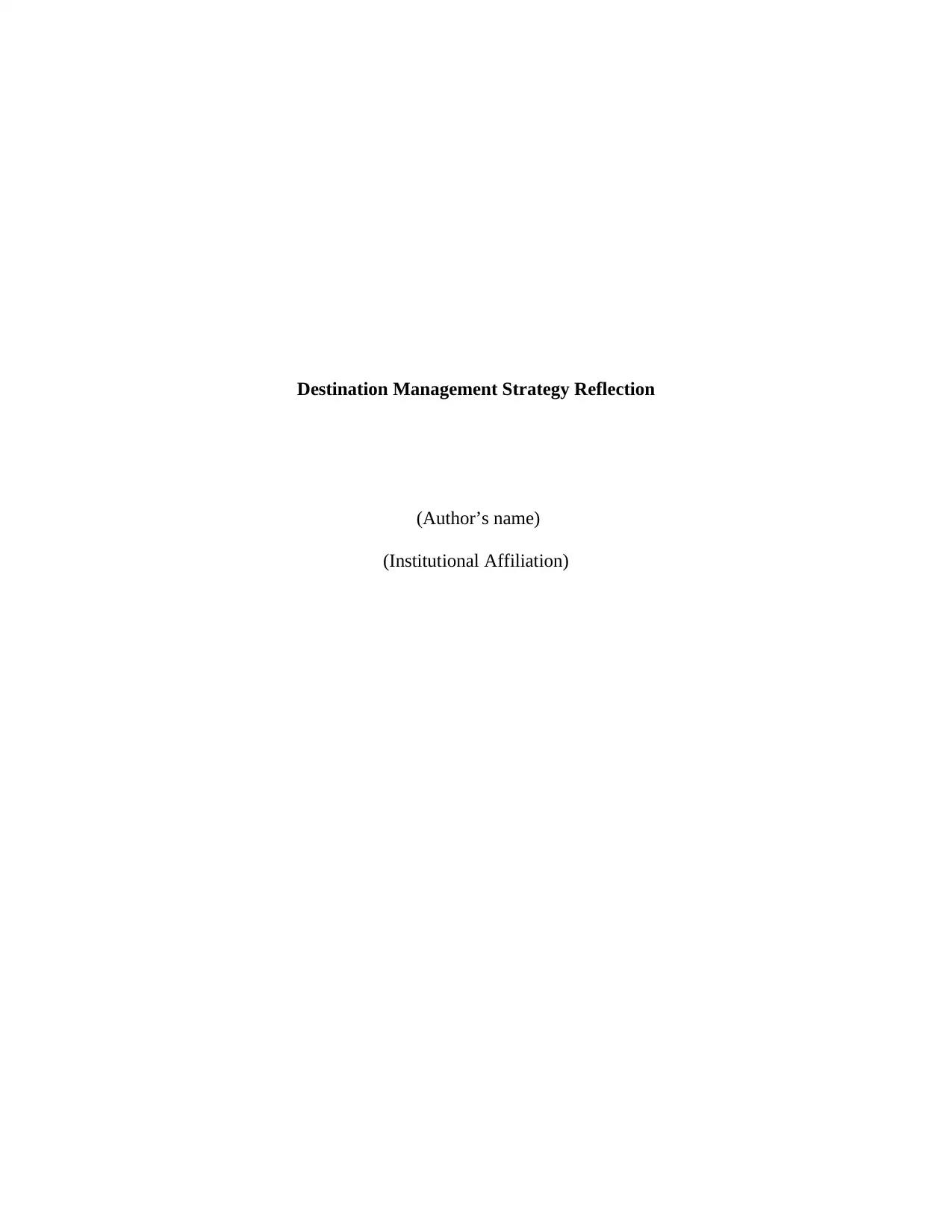
Destination Management Strategy Reflection
(Author’s name)
(Institutional Affiliation)
(Author’s name)
(Institutional Affiliation)
Paraphrase This Document
Need a fresh take? Get an instant paraphrase of this document with our AI Paraphraser
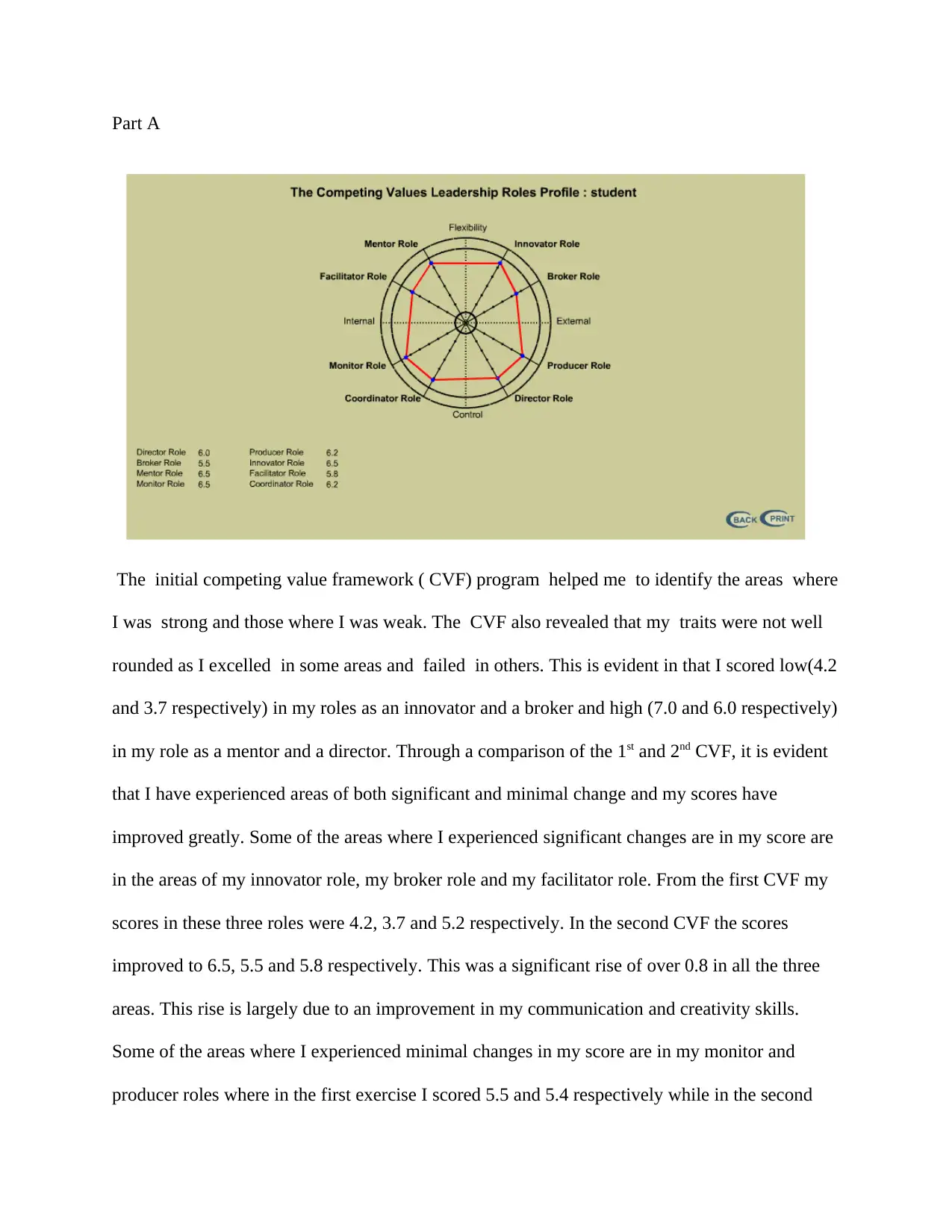
Part A
The initial competing value framework ( CVF) program helped me to identify the areas where
I was strong and those where I was weak. The CVF also revealed that my traits were not well
rounded as I excelled in some areas and failed in others. This is evident in that I scored low(4.2
and 3.7 respectively) in my roles as an innovator and a broker and high (7.0 and 6.0 respectively)
in my role as a mentor and a director. Through a comparison of the 1st and 2nd CVF, it is evident
that I have experienced areas of both significant and minimal change and my scores have
improved greatly. Some of the areas where I experienced significant changes are in my score are
in the areas of my innovator role, my broker role and my facilitator role. From the first CVF my
scores in these three roles were 4.2, 3.7 and 5.2 respectively. In the second CVF the scores
improved to 6.5, 5.5 and 5.8 respectively. This was a significant rise of over 0.8 in all the three
areas. This rise is largely due to an improvement in my communication and creativity skills.
Some of the areas where I experienced minimal changes in my score are in my monitor and
producer roles where in the first exercise I scored 5.5 and 5.4 respectively while in the second
The initial competing value framework ( CVF) program helped me to identify the areas where
I was strong and those where I was weak. The CVF also revealed that my traits were not well
rounded as I excelled in some areas and failed in others. This is evident in that I scored low(4.2
and 3.7 respectively) in my roles as an innovator and a broker and high (7.0 and 6.0 respectively)
in my role as a mentor and a director. Through a comparison of the 1st and 2nd CVF, it is evident
that I have experienced areas of both significant and minimal change and my scores have
improved greatly. Some of the areas where I experienced significant changes are in my score are
in the areas of my innovator role, my broker role and my facilitator role. From the first CVF my
scores in these three roles were 4.2, 3.7 and 5.2 respectively. In the second CVF the scores
improved to 6.5, 5.5 and 5.8 respectively. This was a significant rise of over 0.8 in all the three
areas. This rise is largely due to an improvement in my communication and creativity skills.
Some of the areas where I experienced minimal changes in my score are in my monitor and
producer roles where in the first exercise I scored 5.5 and 5.4 respectively while in the second
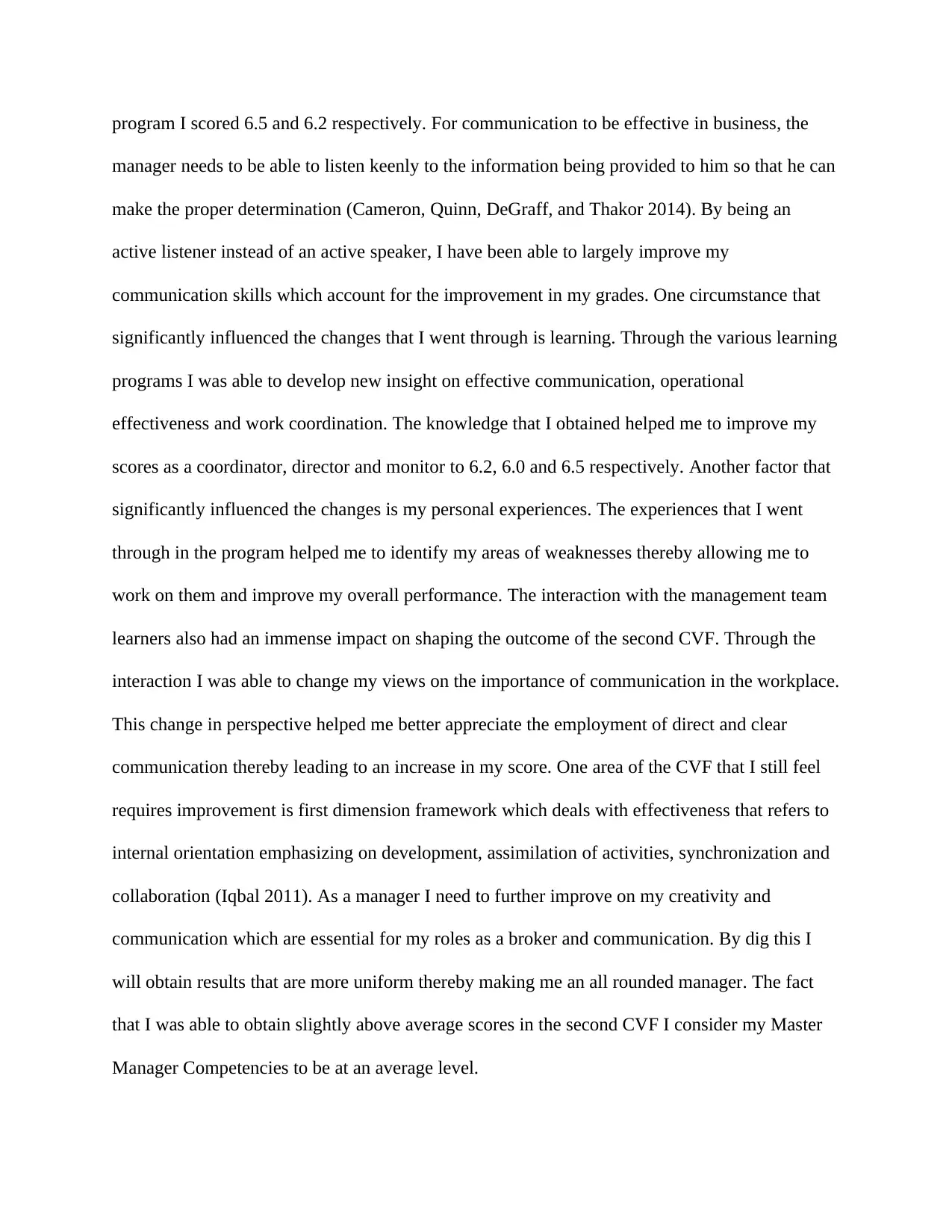
program I scored 6.5 and 6.2 respectively. For communication to be effective in business, the
manager needs to be able to listen keenly to the information being provided to him so that he can
make the proper determination (Cameron, Quinn, DeGraff, and Thakor 2014). By being an
active listener instead of an active speaker, I have been able to largely improve my
communication skills which account for the improvement in my grades. One circumstance that
significantly influenced the changes that I went through is learning. Through the various learning
programs I was able to develop new insight on effective communication, operational
effectiveness and work coordination. The knowledge that I obtained helped me to improve my
scores as a coordinator, director and monitor to 6.2, 6.0 and 6.5 respectively. Another factor that
significantly influenced the changes is my personal experiences. The experiences that I went
through in the program helped me to identify my areas of weaknesses thereby allowing me to
work on them and improve my overall performance. The interaction with the management team
learners also had an immense impact on shaping the outcome of the second CVF. Through the
interaction I was able to change my views on the importance of communication in the workplace.
This change in perspective helped me better appreciate the employment of direct and clear
communication thereby leading to an increase in my score. One area of the CVF that I still feel
requires improvement is first dimension framework which deals with effectiveness that refers to
internal orientation emphasizing on development, assimilation of activities, synchronization and
collaboration (Iqbal 2011). As a manager I need to further improve on my creativity and
communication which are essential for my roles as a broker and communication. By dig this I
will obtain results that are more uniform thereby making me an all rounded manager. The fact
that I was able to obtain slightly above average scores in the second CVF I consider my Master
Manager Competencies to be at an average level.
manager needs to be able to listen keenly to the information being provided to him so that he can
make the proper determination (Cameron, Quinn, DeGraff, and Thakor 2014). By being an
active listener instead of an active speaker, I have been able to largely improve my
communication skills which account for the improvement in my grades. One circumstance that
significantly influenced the changes that I went through is learning. Through the various learning
programs I was able to develop new insight on effective communication, operational
effectiveness and work coordination. The knowledge that I obtained helped me to improve my
scores as a coordinator, director and monitor to 6.2, 6.0 and 6.5 respectively. Another factor that
significantly influenced the changes is my personal experiences. The experiences that I went
through in the program helped me to identify my areas of weaknesses thereby allowing me to
work on them and improve my overall performance. The interaction with the management team
learners also had an immense impact on shaping the outcome of the second CVF. Through the
interaction I was able to change my views on the importance of communication in the workplace.
This change in perspective helped me better appreciate the employment of direct and clear
communication thereby leading to an increase in my score. One area of the CVF that I still feel
requires improvement is first dimension framework which deals with effectiveness that refers to
internal orientation emphasizing on development, assimilation of activities, synchronization and
collaboration (Iqbal 2011). As a manager I need to further improve on my creativity and
communication which are essential for my roles as a broker and communication. By dig this I
will obtain results that are more uniform thereby making me an all rounded manager. The fact
that I was able to obtain slightly above average scores in the second CVF I consider my Master
Manager Competencies to be at an average level.
⊘ This is a preview!⊘
Do you want full access?
Subscribe today to unlock all pages.

Trusted by 1+ million students worldwide
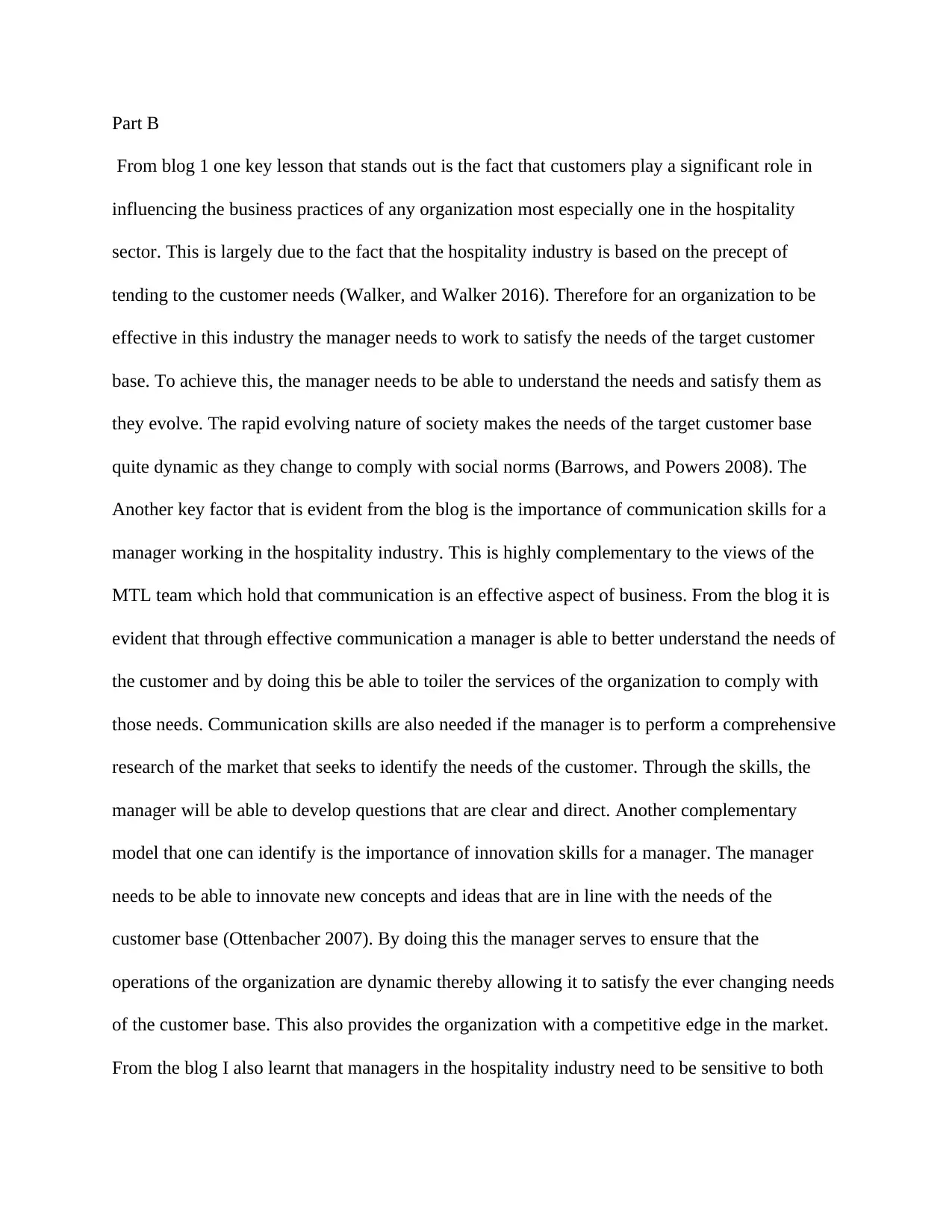
Part B
From blog 1 one key lesson that stands out is the fact that customers play a significant role in
influencing the business practices of any organization most especially one in the hospitality
sector. This is largely due to the fact that the hospitality industry is based on the precept of
tending to the customer needs (Walker, and Walker 2016). Therefore for an organization to be
effective in this industry the manager needs to work to satisfy the needs of the target customer
base. To achieve this, the manager needs to be able to understand the needs and satisfy them as
they evolve. The rapid evolving nature of society makes the needs of the target customer base
quite dynamic as they change to comply with social norms (Barrows, and Powers 2008). The
Another key factor that is evident from the blog is the importance of communication skills for a
manager working in the hospitality industry. This is highly complementary to the views of the
MTL team which hold that communication is an effective aspect of business. From the blog it is
evident that through effective communication a manager is able to better understand the needs of
the customer and by doing this be able to toiler the services of the organization to comply with
those needs. Communication skills are also needed if the manager is to perform a comprehensive
research of the market that seeks to identify the needs of the customer. Through the skills, the
manager will be able to develop questions that are clear and direct. Another complementary
model that one can identify is the importance of innovation skills for a manager. The manager
needs to be able to innovate new concepts and ideas that are in line with the needs of the
customer base (Ottenbacher 2007). By doing this the manager serves to ensure that the
operations of the organization are dynamic thereby allowing it to satisfy the ever changing needs
of the customer base. This also provides the organization with a competitive edge in the market.
From the blog I also learnt that managers in the hospitality industry need to be sensitive to both
From blog 1 one key lesson that stands out is the fact that customers play a significant role in
influencing the business practices of any organization most especially one in the hospitality
sector. This is largely due to the fact that the hospitality industry is based on the precept of
tending to the customer needs (Walker, and Walker 2016). Therefore for an organization to be
effective in this industry the manager needs to work to satisfy the needs of the target customer
base. To achieve this, the manager needs to be able to understand the needs and satisfy them as
they evolve. The rapid evolving nature of society makes the needs of the target customer base
quite dynamic as they change to comply with social norms (Barrows, and Powers 2008). The
Another key factor that is evident from the blog is the importance of communication skills for a
manager working in the hospitality industry. This is highly complementary to the views of the
MTL team which hold that communication is an effective aspect of business. From the blog it is
evident that through effective communication a manager is able to better understand the needs of
the customer and by doing this be able to toiler the services of the organization to comply with
those needs. Communication skills are also needed if the manager is to perform a comprehensive
research of the market that seeks to identify the needs of the customer. Through the skills, the
manager will be able to develop questions that are clear and direct. Another complementary
model that one can identify is the importance of innovation skills for a manager. The manager
needs to be able to innovate new concepts and ideas that are in line with the needs of the
customer base (Ottenbacher 2007). By doing this the manager serves to ensure that the
operations of the organization are dynamic thereby allowing it to satisfy the ever changing needs
of the customer base. This also provides the organization with a competitive edge in the market.
From the blog I also learnt that managers in the hospitality industry need to be sensitive to both
Paraphrase This Document
Need a fresh take? Get an instant paraphrase of this document with our AI Paraphraser
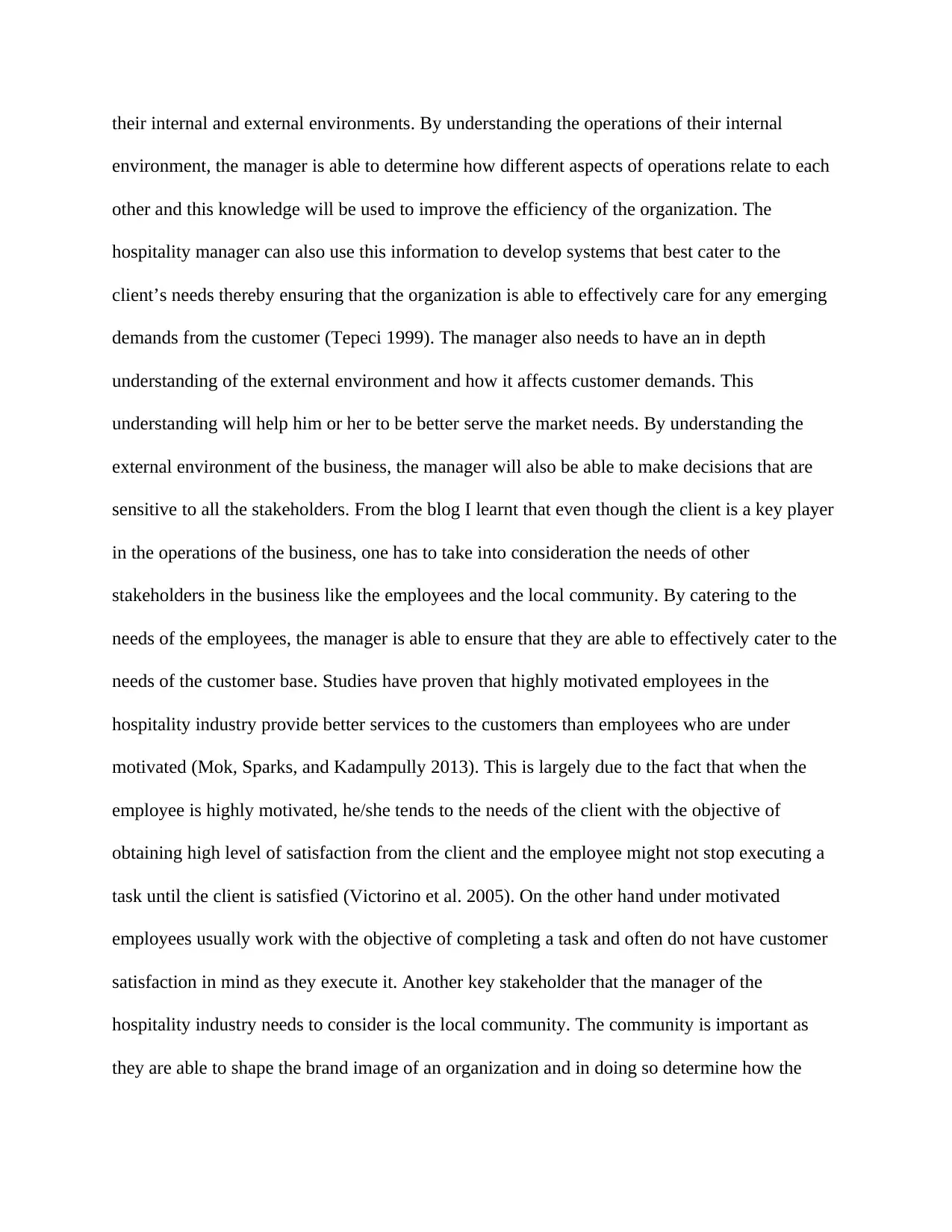
their internal and external environments. By understanding the operations of their internal
environment, the manager is able to determine how different aspects of operations relate to each
other and this knowledge will be used to improve the efficiency of the organization. The
hospitality manager can also use this information to develop systems that best cater to the
client’s needs thereby ensuring that the organization is able to effectively care for any emerging
demands from the customer (Tepeci 1999). The manager also needs to have an in depth
understanding of the external environment and how it affects customer demands. This
understanding will help him or her to be better serve the market needs. By understanding the
external environment of the business, the manager will also be able to make decisions that are
sensitive to all the stakeholders. From the blog I learnt that even though the client is a key player
in the operations of the business, one has to take into consideration the needs of other
stakeholders in the business like the employees and the local community. By catering to the
needs of the employees, the manager is able to ensure that they are able to effectively cater to the
needs of the customer base. Studies have proven that highly motivated employees in the
hospitality industry provide better services to the customers than employees who are under
motivated (Mok, Sparks, and Kadampully 2013). This is largely due to the fact that when the
employee is highly motivated, he/she tends to the needs of the client with the objective of
obtaining high level of satisfaction from the client and the employee might not stop executing a
task until the client is satisfied (Victorino et al. 2005). On the other hand under motivated
employees usually work with the objective of completing a task and often do not have customer
satisfaction in mind as they execute it. Another key stakeholder that the manager of the
hospitality industry needs to consider is the local community. The community is important as
they are able to shape the brand image of an organization and in doing so determine how the
environment, the manager is able to determine how different aspects of operations relate to each
other and this knowledge will be used to improve the efficiency of the organization. The
hospitality manager can also use this information to develop systems that best cater to the
client’s needs thereby ensuring that the organization is able to effectively care for any emerging
demands from the customer (Tepeci 1999). The manager also needs to have an in depth
understanding of the external environment and how it affects customer demands. This
understanding will help him or her to be better serve the market needs. By understanding the
external environment of the business, the manager will also be able to make decisions that are
sensitive to all the stakeholders. From the blog I learnt that even though the client is a key player
in the operations of the business, one has to take into consideration the needs of other
stakeholders in the business like the employees and the local community. By catering to the
needs of the employees, the manager is able to ensure that they are able to effectively cater to the
needs of the customer base. Studies have proven that highly motivated employees in the
hospitality industry provide better services to the customers than employees who are under
motivated (Mok, Sparks, and Kadampully 2013). This is largely due to the fact that when the
employee is highly motivated, he/she tends to the needs of the client with the objective of
obtaining high level of satisfaction from the client and the employee might not stop executing a
task until the client is satisfied (Victorino et al. 2005). On the other hand under motivated
employees usually work with the objective of completing a task and often do not have customer
satisfaction in mind as they execute it. Another key stakeholder that the manager of the
hospitality industry needs to consider is the local community. The community is important as
they are able to shape the brand image of an organization and in doing so determine how the
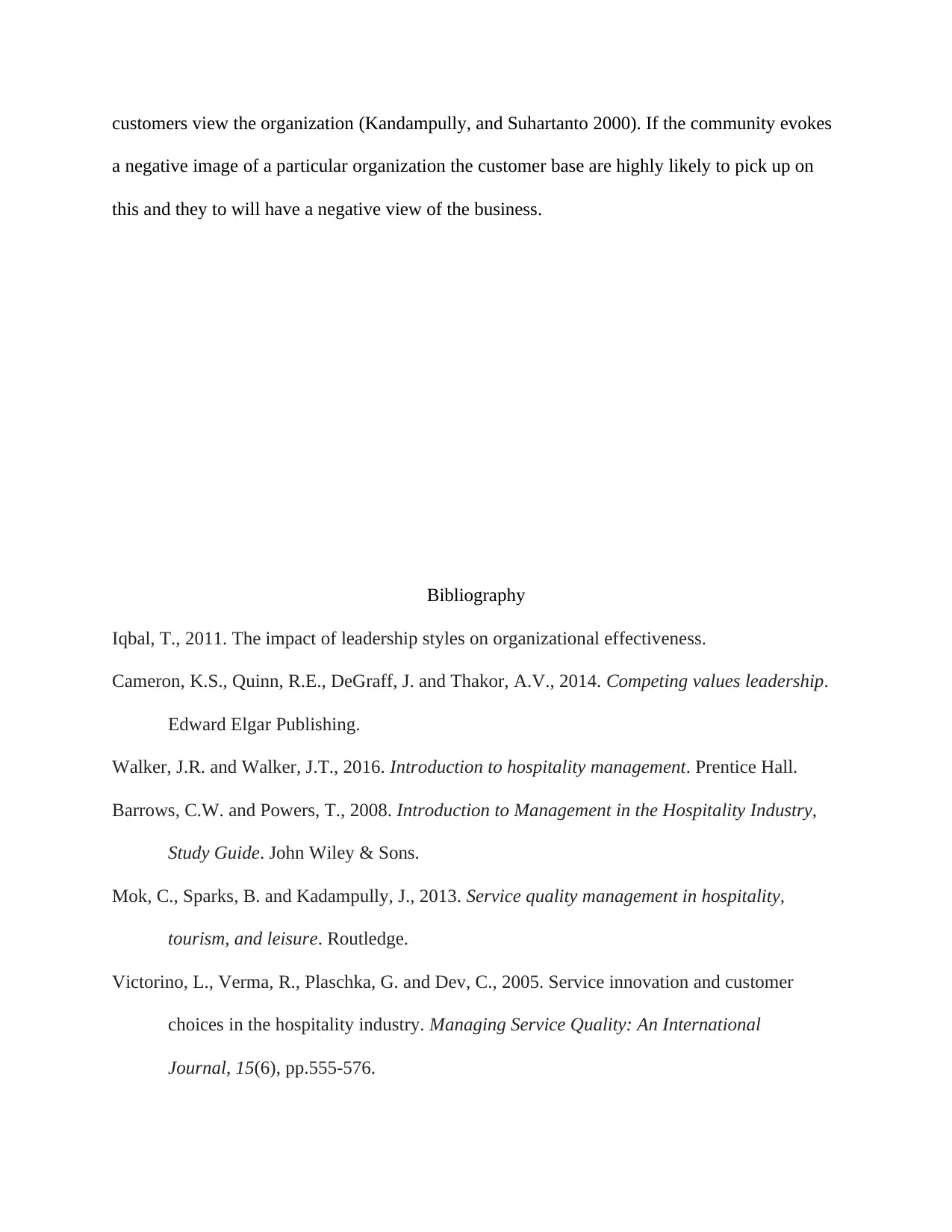
customers view the organization (Kandampully, and Suhartanto 2000). If the community evokes
a negative image of a particular organization the customer base are highly likely to pick up on
this and they to will have a negative view of the business.
Bibliography
Iqbal, T., 2011. The impact of leadership styles on organizational effectiveness.
Cameron, K.S., Quinn, R.E., DeGraff, J. and Thakor, A.V., 2014. Competing values leadership.
Edward Elgar Publishing.
Walker, J.R. and Walker, J.T., 2016. Introduction to hospitality management. Prentice Hall.
Barrows, C.W. and Powers, T., 2008. Introduction to Management in the Hospitality Industry,
Study Guide. John Wiley & Sons.
Mok, C., Sparks, B. and Kadampully, J., 2013. Service quality management in hospitality,
tourism, and leisure. Routledge.
Victorino, L., Verma, R., Plaschka, G. and Dev, C., 2005. Service innovation and customer
choices in the hospitality industry. Managing Service Quality: An International
Journal, 15(6), pp.555-576.
a negative image of a particular organization the customer base are highly likely to pick up on
this and they to will have a negative view of the business.
Bibliography
Iqbal, T., 2011. The impact of leadership styles on organizational effectiveness.
Cameron, K.S., Quinn, R.E., DeGraff, J. and Thakor, A.V., 2014. Competing values leadership.
Edward Elgar Publishing.
Walker, J.R. and Walker, J.T., 2016. Introduction to hospitality management. Prentice Hall.
Barrows, C.W. and Powers, T., 2008. Introduction to Management in the Hospitality Industry,
Study Guide. John Wiley & Sons.
Mok, C., Sparks, B. and Kadampully, J., 2013. Service quality management in hospitality,
tourism, and leisure. Routledge.
Victorino, L., Verma, R., Plaschka, G. and Dev, C., 2005. Service innovation and customer
choices in the hospitality industry. Managing Service Quality: An International
Journal, 15(6), pp.555-576.
⊘ This is a preview!⊘
Do you want full access?
Subscribe today to unlock all pages.

Trusted by 1+ million students worldwide
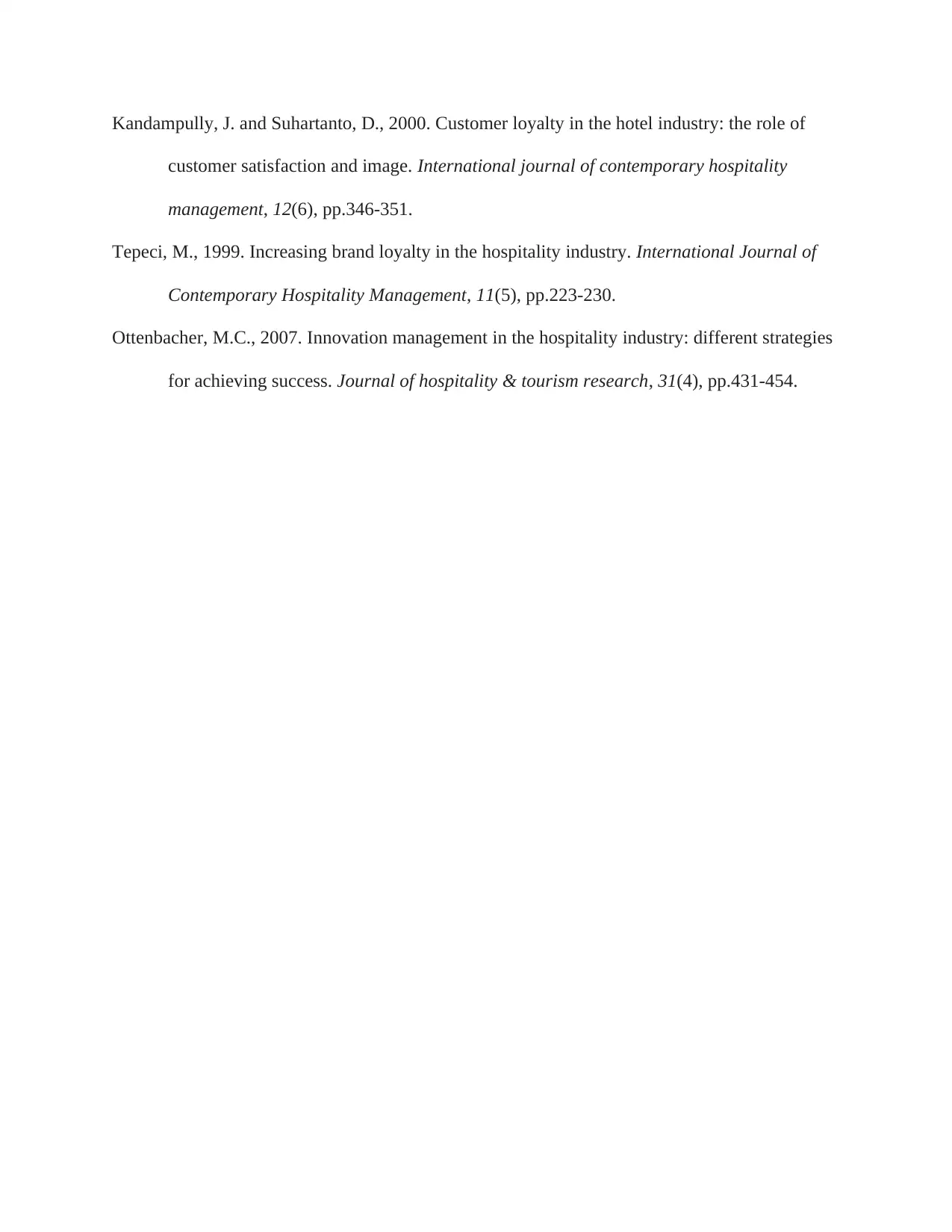
Kandampully, J. and Suhartanto, D., 2000. Customer loyalty in the hotel industry: the role of
customer satisfaction and image. International journal of contemporary hospitality
management, 12(6), pp.346-351.
Tepeci, M., 1999. Increasing brand loyalty in the hospitality industry. International Journal of
Contemporary Hospitality Management, 11(5), pp.223-230.
Ottenbacher, M.C., 2007. Innovation management in the hospitality industry: different strategies
for achieving success. Journal of hospitality & tourism research, 31(4), pp.431-454.
customer satisfaction and image. International journal of contemporary hospitality
management, 12(6), pp.346-351.
Tepeci, M., 1999. Increasing brand loyalty in the hospitality industry. International Journal of
Contemporary Hospitality Management, 11(5), pp.223-230.
Ottenbacher, M.C., 2007. Innovation management in the hospitality industry: different strategies
for achieving success. Journal of hospitality & tourism research, 31(4), pp.431-454.
1 out of 7
Related Documents
Your All-in-One AI-Powered Toolkit for Academic Success.
+13062052269
info@desklib.com
Available 24*7 on WhatsApp / Email
![[object Object]](/_next/static/media/star-bottom.7253800d.svg)
Unlock your academic potential
Copyright © 2020–2026 A2Z Services. All Rights Reserved. Developed and managed by ZUCOL.





